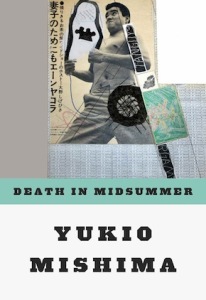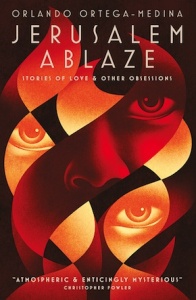Yukio Mishima: ‘Swaddling Clothes’
by Orlando Ortega-Medina ‘Swaddling Clothes’ by Yukio Mishima has haunted me ever since I encountered it twenty years ago when I was a literature student at UCLA. It is a fascinating character study of Toshiko, a woman consumed by her fear of inescapable fate – a subject that fascinates me. Over the years, the character of Toshiko has served as a model for some of the characters in my own fiction, and, as explained below, ‘Swaddling Clothes’ in particular directly inspired ‘Torture by Roses’, the first story in my collection Jerusalem Ablaze: Stories of Love and Other Obsessions.
‘Swaddling Clothes’ by Yukio Mishima has haunted me ever since I encountered it twenty years ago when I was a literature student at UCLA. It is a fascinating character study of Toshiko, a woman consumed by her fear of inescapable fate – a subject that fascinates me. Over the years, the character of Toshiko has served as a model for some of the characters in my own fiction, and, as explained below, ‘Swaddling Clothes’ in particular directly inspired ‘Torture by Roses’, the first story in my collection Jerusalem Ablaze: Stories of Love and Other Obsessions.
‘Swaddling Clothes’ opens with Toshiko (the only named character) riding home in a taxi into which her actor husband has quickly bundled her, as he dashes off to his next engagement from the Ginza nightclub where he was entertaining guests. The author describes Toshiko as the sensitive, anxiety-ridden wife of an attractive movie star, looking “… more like a transparent picture than a creature of flesh and blood.” During the ride, Toshiko reflects on the evening, painfully recalling her husband plying his guests with a jolly account of how their newborn son’s wet nurse unexpectedly gave birth to a bastard baby boy in their sitting room the night before. In his retelling of the incident, Toshiko’s husband callously refers to the wet nurse in animalistic terms (“We rushed in and found her… moaning like a cow… The whole time she was yelling like a stuck pig”); and he jokes about how he was able to rescue his good rug before the wet nurse made a “pretty shambles” of the room, leaving indelible bloodstains on the parquet floor. His guests respond with explosions of laughter before moving on to the next bit of entertaining gossip.
Toshiko is the only person on the planet who witnessed the child’s unpropitious birth and the indignity of being left practically discarded on the floor wrapped in bloody newspapers.”
Almost immediately, one notes that ‘Swaddling Clothes’ is a study of contrasts, which amounts to a veiled critique of Western culture, and perhaps a warning against the dangers of Westernisation. Toshiko’s husband and his friends dress in American-style suits and puff on cigars; they enjoy spending time in nightclubs and listening to jazz. They are loud, brash and soulless, as evidenced by their finding humour in the hapless wet nurse’s misfortune. By contrast, Toshiko dresses in a traditional kimono (as does the wet nurse). She feels out of place in nightclubs, and prefers the comforts of home, although less so now that her husband has appointed theirs with Western-style furniture. More importantly, she is sensitive, careful of the feelings of others, and anxious about how her actions may impact others.
As the taxi makes its way to the fashionable Shinjuku neighbourhood of Ushigomé on the other side of the Imperial Palace where Toshiko and her husband live, she continues to reflect on the incident the night before. She recalls how her husband conveniently slipped away once the maternity doctor arrived, leaving her to watch helplessly as the doctor scornfully wrapped the newborn in discarded newspaper, rather than in proper swaddling.
Offended and disgusted by the sight of the poor child left lying on the floor wrapped in bloody newspapers (“it was a scene fit for a butchershop”), Toshiko rescues him before his mother sees him that way, washes him clean of afterbirth, wraps him in a brand-new flannel blanket, and places him on the cushion of a comfortable armchair in the sitting room.
Even though she feels certain that she acted correctly in performing this kindness for the child and his mother, Toshiko is nevertheless anxious over the fact that she is the only person on the planet who witnessed the child’s ‘shame’ – his unpropitious birth and the indignity of being left practically discarded on the floor wrapped in bloody newspapers. She feels somehow guilty and fears that her possession of this knowledge will return to haunt her.
As the taxi progresses along the darkened road that encircles the Imperial Palace moat, Toshiko continues to obsess over the incident. She fears that in twenty years’ time, by some quirk of fate, the child – then an angry young man who could never become a respectable citizen, and who would most likely have had a terrible upbringing – may one day meet her fine, carefully-educated son and take out his resentment on him by savagely stabbing him to death with a knife.
Rather than surrender to fate and place her son at risk, Toshiko resolves to seek out the young man on her own in twenty years’ time to reveal to him the full circumstances of his birth and to, in effect, sacrifice herself in place of her son. If the young man is going to kill anyone, she reasons, it should be her rather than her innocent son. She reaches this decision just as the taxi approaches the British Embassy, directly across from Chidorigafuchi (‘The Abyss of a Thousand Birds’), an intriguingly-named park overlooking the Imperial Palace moat, which is reputed to be the best spot in Tokyo to view the cherry blossoms in April.
Against her better judgment, Toshiko leaps out of the taxi and crosses the road to the park, which by now is pitch dark and devoid of anyone except a few random couples lying here and there, entwined amongst the cherry trees. Toshiko aimlessly wanders the empty park, increasingly distressed over her fears for the future, when she suddenly catches sight in the distance of a prone, white figure, hovering in the darkness about two feet above the ground. She is drawn to the figure, which turns to be a young man asleep on a park bench, covered in a makeshift blanket fashioned out of newspaper. She leans over him to get a better look. And then it happens:
In the silent night the newspaper bedding rustled, and abruptly the man opened his eyes. Seeing the… woman standing directly beside him, he raised himself with a jerk, and his eyes lit up. A second later a powerful wrist reached out and seized Toshiko by her slender wrist.
She did not feel in the least afraid and made no effort to free herself. In a flash the thought had struck her, Ah, so the twenty years have already gone by! The forest of the Imperial Palace was pitch dark and utterly silent.
At first reading, this abrupt ending disturbed me. I found myself desperately wanting to know what happened next. I was particularly intrigued by the young man on the bench. What was he doing there? Why was he covered in newspaper? Why did he grab Toshiko’s wrist? Did he actually assault her, as could be implied by Toshiko’s clear willingness to take whatever consequences awaited her? Or was he simply defending himself in his half-sleep against a perceived attack?
I found myself obsessing about the ending over the course of several days, and I scoured books in the university library about Mishima’s work, searching for information about the story. But I could find nothing beyond a few bits of superficial analysis. Finally, I decided that to resolve the problem I needed to write my own parallel story told from the young man’s point of view – similar to how Jean Rhys conceived Wide Sargasso Sea as a parallel story to Jane Eyre.
As I developed the story which eventually became ‘Torture by Roses’, it took on its own life and developed into what it is today – an homage to Yukio Mishima, and an exploration of the polarities of Love and Hate; Youth and Old Age; Beauty and Ugliness. It is also an exploration of ambition and callousness, which is a theme that moved Mishima and infuses much of my work. And, yes, I frequently end my stories abruptly, leaving open the door for other writers to swoop in and create their own parallel stories.
 Jerusalem Ablaze: Stories of Love and Other Obsessions by Orlando Ortega-Medina is out now (Paperback £8.99) from Cloud Lodge Books.
Jerusalem Ablaze: Stories of Love and Other Obsessions by Orlando Ortega-Medina is out now (Paperback £8.99) from Cloud Lodge Books.
Read more.
‘Swaddling Clothes’ by Yukio Mishima is in the collection Death in Midsummer & Other Stories, published by New Directions in a translation by Ivan Morris. Read more.
Buy at amazon.co.uk
Orlando Ortega-Medina was born in California of Judeo-Spanish descent via Cuba. He studied English Literature at UCLA and has a Juris Doctor law degree from Southwestern University School of Law. At university he won The National Society of Arts and Letters award for Short Stories. He is now a British national and resides in London, where he practices US immigration law.
orlandoortegamedina.co.uk
@OOrtegaMedina


